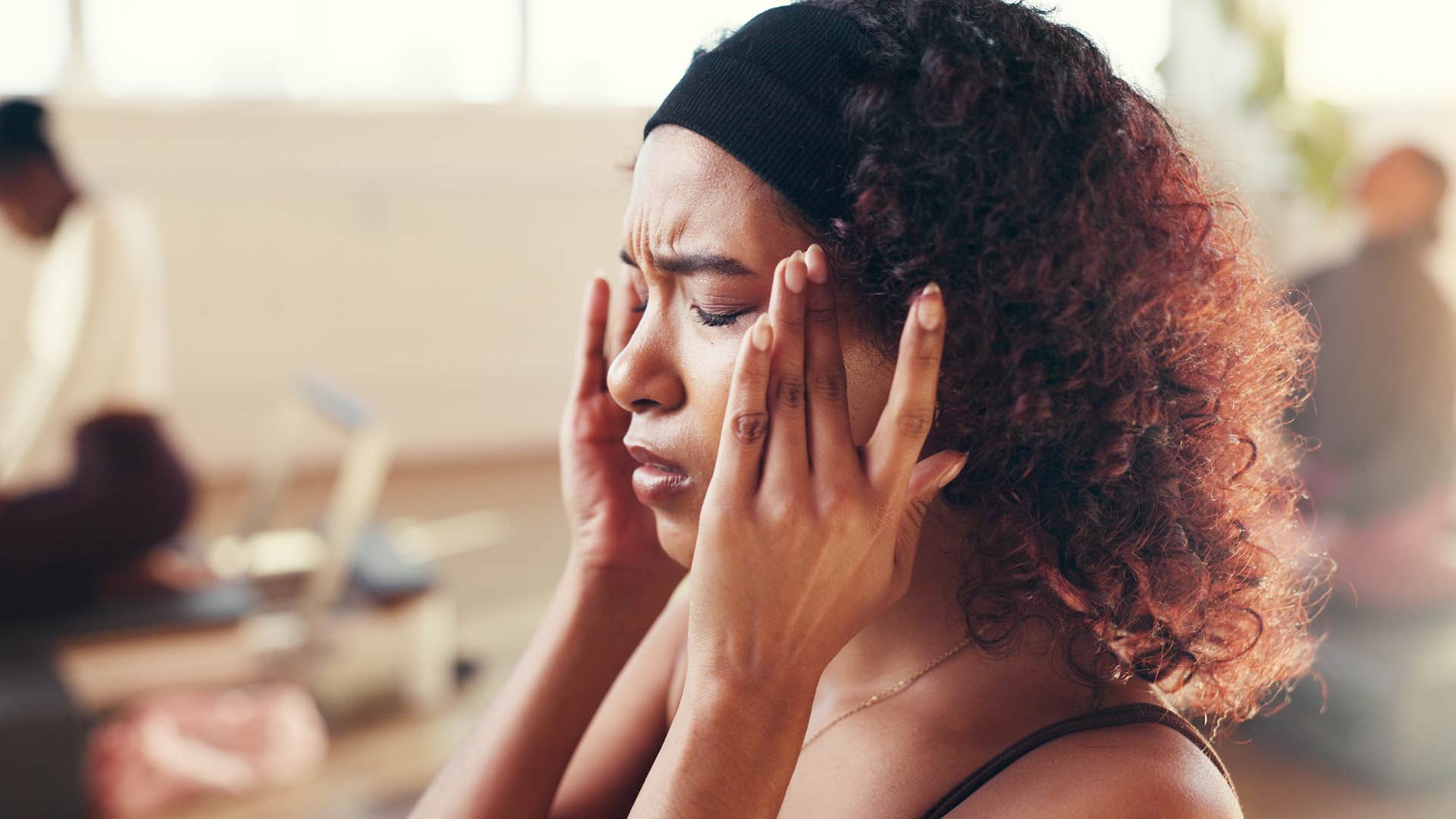If You’ve Ever Had A Headache That Feels Different, These 12 Migraine Symptoms Explain Why
From buzzing pain to vision changes, these symptoms explain what's really going on in your head.
 Karola G | Canva
Karola G | Canva Migraines are more than just "really bad headaches." They're complex neurological events that can completely change how your body feels, how you think, and even how you see. For some, migraines start with throbbing pain behind one eye. For others, it's dizziness, tingling skin, or even a burst of electric shock-like sensations in the head or neck. Because migraines show up so differently from person to person, it's easy to mistake them for something else — or worse, to feel like no one understands what you're going through.
The hardest part about living with migraines isn't just the pain itself. It's trying to explain it to people who've never experienced one. But the more you understand your symptoms, the easier it is to get the care and empathy you deserve. These 12 migraine symptoms help explain why your headaches feel so different — and can help you recognize the signs that what you're dealing with isn't "just a headache."
If you've ever had a headache that feels different, these 12 migraine symptoms explain why:
1. Buzzing electricity
 Prostock-studio / Shutterstock
Prostock-studio / Shutterstock
Migraines make your brain feel electrified. You might feel regular shocks on your head or residual burning pain as if an electrical current is making its way through your brain.
Typically, electrical pain starts at the base of your skull and can radiate to your scalp. Occasionally, the feeling may also be felt in your neck, and all affected areas may be tender after an episode.
2. Loss of feeling
 fizkes / Shutterstock
fizkes / Shutterstock
Sometimes, during a migraine attack, you might lose feeling in a part of your face or your limbs. This stroke-like symptom can be incredibly scary, especially if you've never experienced it before.
The numbness can last for a few hours and may be accompanied by speech problems, muscle weakness, or confusion. Research has found that during the aura phase, a spreading wave of neurological disruption happens, which can cause temporary sensory symptoms.
3. Throbbing head pain
 Farknot Architect / Shutterstock
Farknot Architect / Shutterstock
Throbbing is one of the most common symptoms of a migraine. Pulsing sensations tend to be felt in only one side of the head and can continue for days if you're unlucky. The throbbing can get so extreme that your balance and coordination may be affected.
The throbbing is linked to the activation of the trigeminal nerve, which is the brain's main sensory nerve for the head. The trigeminal nerve can also cause cranial blood vessels to dilate. Research has concluded that this, combined with the nature of blood flow from the heart, is thought to be a primary cause of the 'throbbing' sensation.
4. Light sensitivity
 siro46 / Shutterstock
siro46 / Shutterstock
Known as photophobia, this is another common migraine symptom. Bright lights often become burdensome when a migraine first hits, encouraging you to find a dark space to relax in.
Wearing an eye mask and just turning off lights and electronic devices are great ways to prevent the discomfort that you feel when looking at light. Doctors use this migraine symptom to diagnose many chronic migraine sufferers.
5. Blurry vision and auras
 Kateryna Onyshchuk / Shutterstock
Kateryna Onyshchuk / Shutterstock
Vision changes, including blurred vision and the temporary loss of vision, can occur during migraine attacks. You may see flashes of light, blind spots, and other floating objects in your field of view. These visual signs are known as auras and are a symptom of classic migraines.
This is caused by a temporary wave of electrical and chemical activity moving across the brain. Research has found that when this wave passes through the visual cortex, it disrupts normal brain cell function, leading to visual disturbances.
6. Pain with touch
 Photoroyalty / Shutterstock
Photoroyalty / Shutterstock
Gentle touches that usually don't hurt you may be painful during a migraine attack. Brushing your hair, laughing, and showering may trigger intense pain throughout your body. However, migraine sufferers often experience allodynia only on their head. If you're like me, then the pain might even come when you place your head on a pillow.
7. Stiffness and tension
 mapo_japan / Shutterstock
mapo_japan / Shutterstock
Moving can be more difficult when migraines are involved. Your jaw might feel as if it's wired shut, and your neck may not turn so smoothly.
If you have a tension migraine headache, then you may also be clenching your shoulder, back, and neck muscles without even realizing it.
Important note: A stiff neck may be a sign of a more serious health condition, so contact your doctor to rule out other issues.
8. Dizziness or light-headedness
 PeopleImages / Shutterstock
PeopleImages / Shutterstock
Migraines make a lot of people feel dizzy and faint. Vestibular migraines (i.e., migraines that cause vertigo) can be dangerous if not treated carefully. If you feel light-headed during a migraine headache, then you should change positions slowly and drink lots of fluids. You should also avoid looking up or down while walking.
The brain integrates signals for balance from the inner ear, eyes, and body, research has shown. During a migraine, chemical and blood flow changes in the brain can distort the signals from the inner ear, leading to a feeling of being off-balance or that the room is spinning.
9. Ringing in your ears (tinnitus)
 Kittyfly / Shutterstock
Kittyfly / Shutterstock
Migraines are linked to tinnitus and other hearing disturbances. Auras may cause the ringing, but it may occur without an aura.
The ringing in your ears during migraines is high-pitched, sometimes replacing other sounds in the room. The duration of tinnitus episodes varies.
Studies show a higher prevalence of tinnitus in people with migraines compared to those without — a substantial percentage of migraine sufferers with tinnitus report that their tinnitus intensifies during a headache episode.
10. Pressure in your head
 Antonio Guillem / Shutterstock
Antonio Guillem / Shutterstock
Tightness or a squeezing feeling around your head is a common migraine symptom. The pressure can be throughout your head or centralized to a certain part.
It might feel like you have a head cold. For adults, stress migraines are likely the culprits of this symptom.
11. Nausea and stomach upset
 Nicoleta Ionescu / Shutterstock
Nicoleta Ionescu / Shutterstock
Stomach issues like nausea and vomiting are common symptoms as well. Because migraines are disorienting, you may feel uneasiness in your stomach or have to use the restroom more frequently.
Certain foods may make you feel sick, and doing anything (besides sleeping) can upset your stomach. Nausea can be a symptom that appears before the headache itself, suggesting it is not a direct result of the pain but a central neurological event, one study argued.
12. Pins and needles
 Dragana Gordic / Shutterstock
Dragana Gordic / Shutterstock
You know the feeling. It's like when your foot falls asleep because you've been sitting on it. But, this time, it's your head that's falling asleep — and maybe parts of your face.
Research has explained that this wave of neural firing and subsequent suppression temporarily alters blood flow and nerve function in the affected area, leading to sensory disturbances. A bunch of pinpricks jamming into your skull isn't exactly pleasant.
Meaghan Summers is a freelance editor for Sourcebooks, an independent consultant for Fiverr, and an associate editor for Defense Security Cooperation University. Her writing covers mental health, pop culture, and relationship topics.

